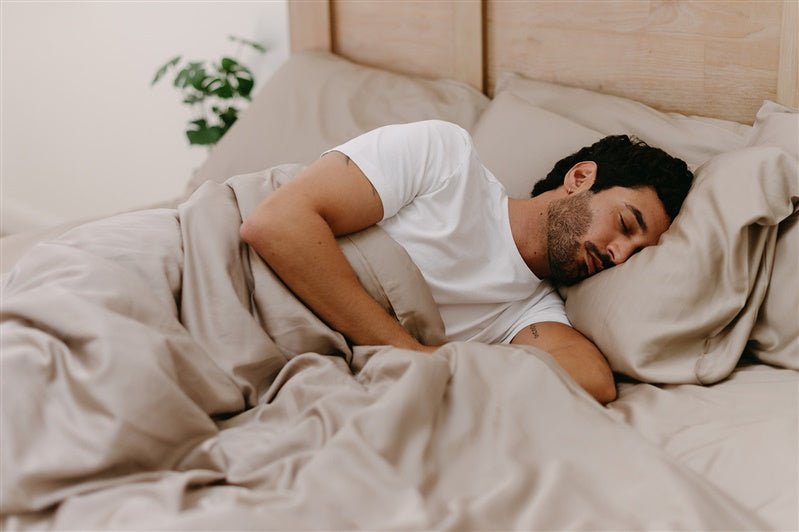
Men’s Health Month - Understanding the links between stress and sleep
June is Men's Health Month, a time to raise awareness about men's health issues and encourage men to prioritise their health and well-being. One area that is particularly important for men's health is sleep. Getting enough good quality sleep and managing stress can have a significant impact on overall wellness and a healthy lifestyle. The connection between sleep, stress, and men's health is clear, and we have put together some tips for improving sleep and reducing stress.

Sleep and Men's Health
There is no doubt that sleep is a critical factor for everyone when it comes to maintaining good health and wellbeing. There is a rise in sleep-related health issues such as sleep apnea, which causes poor sleep quality. People, and men in particular, are also not getting the recommended 8 hours of sleep a night.
In addition to sleep apnea, men may also be more likely to have trouble falling asleep or staying asleep due to stress, anxiety, or other factors. This can lead to a range of negative health outcomes, including increased risk of depression, anxiety, and other mental health issues.
Matthew Walker, Director of the Center for Human Sleep Science, comments on how we have allowed the importance of sleep to fall in terms of our priorities: ‘I think sleep is a missing piece in the puzzle of health. It’s not something people are necessarily recognising as a critical issue when it comes to fighting disease and sickness’.
How Sleep Impacts Stress
Sleep and stress are closely linked. Lack of sleep can make it more difficult to manage stress, and stress can and does interfere with sleep quality. When we're stressed, our bodies release hormones such as adrenaline and cortisol, which can make it difficult to relax and fall asleep. This can create a cycle of stress and poor sleep that can be difficult to break.
Getting enough good quality sleep, however, can help reduce stress levels and improve overall health and well-being. During sleep, our bodies repair, recharge and regenerate, allowing us time and opportunity for our brains to switch off. This can help reduce the impact of stress on our bodies and minds, which is why it is crucial to include regular, good-quality sleep as part of a healthy lifestyle.
Tips for Improving Sleep and Reducing Stress
If you're struggling with sleep or stress, there are many things you can do to improve your health and well-being. Here are some tips to get you started:
1. Sticking to a realistic sleep schedule
Going to bed and waking up at the same time every day can help regulate your body's natural sleep-wake cycle. Aim for 8 hours of sleep per night, and try to avoid staying up late or sleeping in. Your body can quickly adapt to a new sleep cycle, so maintaining a regular schedule is a huge benefit, health-wise.
2. Create a Relaxing Sleep Environment
Your bedroom should be a comfortable and relaxing space that promotes sleep. Make sure your bed is comfortable and supportive, and reduce noise and light as much as possible. You may also want to consider investing in blackout curtains, a white noise machine, or other sleep aids to help you sleep more soundly. And of course, good quality organic bedding is another way to ensure you have a restful sleep.
3. Practice Good Sleep Hygiene
Good sleep hygiene includes habits and behaviours that promote good sleep, which in turn promote good sleep. This includes avoiding caffeine and alcohol right before bed, avoiding screens for at least an hour before attempting sleep, and engaging in relaxing activities such as reading or taking a warm bath. It is recommended to keep phones out of the bedroom or at least away from your bed to reduce exposure to blue-light.
4. Exercise Regularly
Regular exercise is not only a key part of a healthy lifestyle, but can help reduce stress and improve sleep quality. Aiming for 30 minutes of moderate-intensity exercise each day of the week is recommended, but be sure to avoid exercising too close to bedtime. This can negatively interfere with sleep, due to the hormones released from exercise and the increased feeling of wakefulness.
5. Practice Stress-Reduction Techniques
There are many techniques you can use to combat and reduce stress. This includes meditation, breathing exercises, and yoga. Experiment with different techniques to find what works best for you, and make a habit of practicing stress reduction on a regular basis. Adding this in as part of your sleep schedule will help you reduce stress before sleeping, which will enable you to experience a more restful night.
6. Seek Professional Help if Necessary
If you're struggling with sleep or stress and nothing seems to be helping, it may be time to seek professional help. Your healthcare provider can help you identify underlying health issues that may be contributing to your sleep or stress problems, and can recommend treatments or therapies that can help.

Sleep and stress are both critical components of men's health, and prioritising both can have a significant impact on overall health and well-being. By following the tips outlined above, you can improve your sleep quality and reduce stress levels, which will have a positive effect on your health as a whole. Remember, taking care of yourself needs to be a priority, and by understanding the importance of sleep and stress reduction, you can improve your quality of life and feel your best.

